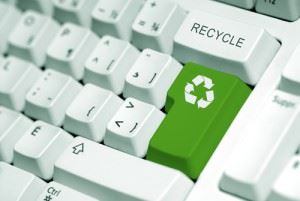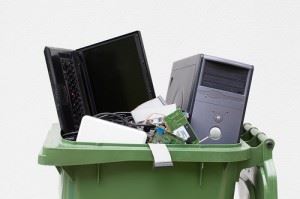The field of e-waste recycling is starting to gain more attention, especially from municipalities and consumers. With more electronic devices entering the market every day, and a seemingly endless need to acquire the newest and best model, it’s important for us to safely dispose of what’s old or broken. Read on for an exploration of e-waste recycling and how it works.
What Is E-Waste?
E-waste, sometimes called electronic waste, is another word for discarded electronic items. These items include computers, tablets, cell phones, MP3 players and a plethora of other high-tech devices. They may be broken, or they may still function.
Why Is E-Waste Recycling So Important?
Electronic devices are filled with toxic materials. These include lead, mercury, cadmium and other  heavy metals. If e-waste is thrown in the trash, it typically ends up in the landfill, where these chemicals can leech into water and soil and poison them. Protecting the environment from these chemicals is one of the key goals of e-waste recycling.
heavy metals. If e-waste is thrown in the trash, it typically ends up in the landfill, where these chemicals can leech into water and soil and poison them. Protecting the environment from these chemicals is one of the key goals of e-waste recycling.
Likewise, e-waste recycling retrieves these metals and other chemicals for future use. Unfortunately, suppliers often mine these substances via environmentally destructive and socially exploitative methods. By re-purposing these substances, you can do your part to discourage destructive, dangerous mining techniques.
How Does E-Waste Recycling Work?
Just throwing your e-waste into the trash means it’ll end up in a landfill, rather than being put through an e-waste recycling process. To recycle your electronic waste, you’ll need to make sure it goes specifically into an e-waste recycling program. Thankfully, many municipalities are recognizing and filling the need for this specialized kind of recycling.
What exactly happens to your device at that point depends on the state it’s in. If your device is still essentially functional — say, if it simply has a cracked screen, or if it just needs an upgrade — an e-waste recycling specialist may just replace those parts and put the device back on the market. If your device is more substantially damaged or is significantly out of date, it may be broken down for parts, or it may be melted down so that the heavy metals inside can be removed and reused.
If you’ve got computers, phones and other electronic devices that meet the definition of e-waste, Junk King can help. We’re pros at hauling away your junk, and making sure it gets where it needs to go. Contact us today and see why so many homeowners and businesses trust us to help you get your junk situation under control.
 Text Us
Text Us





 No matter how much high-tech awesomeness your computer is packed with right now, it will eventually stop working — or just become too outdated to be worth powering on. When this happens, you need to figure out what to do with it. Just so you know, throwing it into the garbage isn’t the answer. You need to recycle your computer. Putting together the parts that make up a computer takes a lot of energy. Technology makers use much less energy when they don’t have to dig up fresh raw materials and create new parts. This means that recycling your computer will be a big boon for the management of sustainable waste energy.
No matter how much high-tech awesomeness your computer is packed with right now, it will eventually stop working — or just become too outdated to be worth powering on. When this happens, you need to figure out what to do with it. Just so you know, throwing it into the garbage isn’t the answer. You need to recycle your computer. Putting together the parts that make up a computer takes a lot of energy. Technology makers use much less energy when they don’t have to dig up fresh raw materials and create new parts. This means that recycling your computer will be a big boon for the management of sustainable waste energy. The holidays are a popular time for receiving new electronics, especially computers. Once you transfer the data from your old machine to the new, you’ll probably decide on computer recycling for yesterday’s model. Computer recycling used to be fairly easy: remove and smash the hard drive and then dispose of the shell. Today it isn’t quite so simple.
The holidays are a popular time for receiving new electronics, especially computers. Once you transfer the data from your old machine to the new, you’ll probably decide on computer recycling for yesterday’s model. Computer recycling used to be fairly easy: remove and smash the hard drive and then dispose of the shell. Today it isn’t quite so simple.